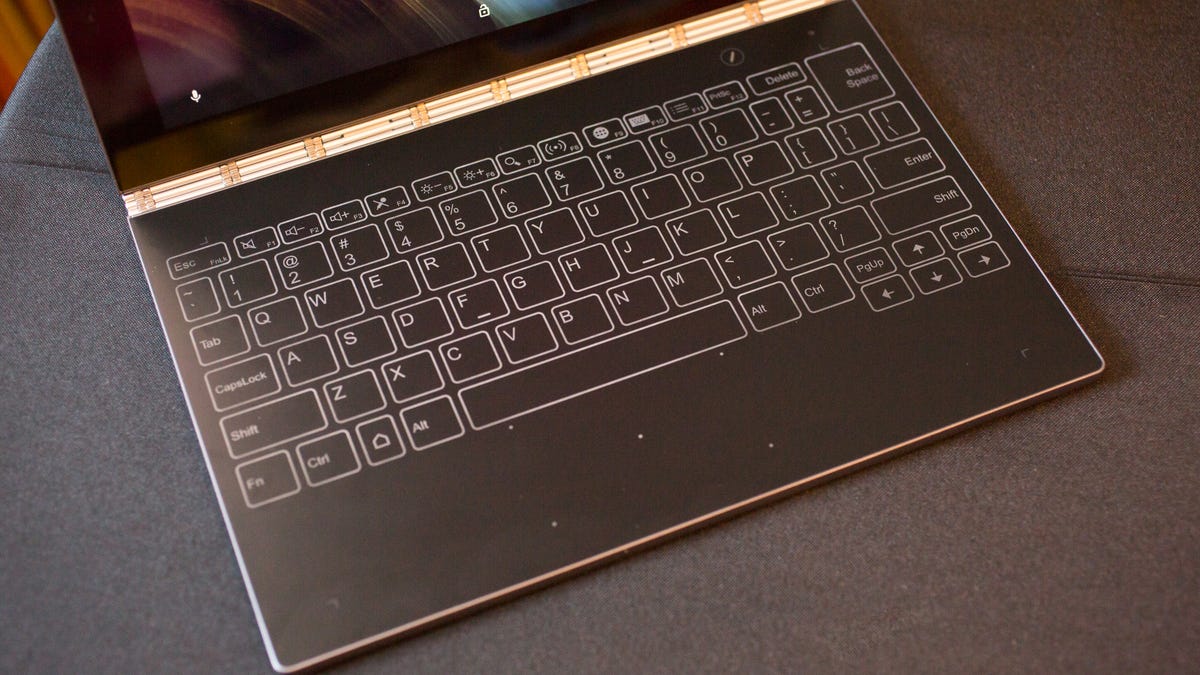Lenovo's Yoga Book could make physical keyboards an endangered species
The new hybrid skips the traditional keyboard in favor of a touchscreen digital one, offering a signal of how gadgets may evolve.

Give up my physical keyboard for a touchscreen phone? I don't think so.
--Any BlackBerry user, circa 2008.
It wasn't long ago that power users would scoff at the thought of banging out an email on an iPhone, preferring the tactile precision of physical keys.
Fast-forward to today, and touchscreen typing is the norm. A BlackBerry, or really any phone with a physical keyboard, is the gimmick now.
Could the same kind of evolution happen with laptops and larger devices? Like the BlackBerry user of yore, you may dismiss the idea that the physical keyboard could go extinct. After all, if you've got some heavy-duty writing to do, you're going to be on your computer.
But at least one company is trying to blaze a new trail. Lenovo on Wednesday introduced the Yoga Book, a unique tablet/hybrid PC with two touchscreen displays that fold in on each other. A normal display makes up the top half, while the bottom half is a touchscreen featuring a digital "smart keyboard."
Lenovo's investment in such a product underscores the shifting patterns in how consumers -- particularly younger people -- interact with devices. The company's research found that people under 30 took to the digital keyboard immediately, while those older than 30 approached it with skepticism. If the Yoga Book takes off, it could mark the starting point for when the physical keyboard loses its spot as the go-to tool for composing a note.
"While the traditional keyboard or laptop are unlikely to disappear entirely, other devices will take over more of our computing tasks," said Avi Greengart, an analyst at Current Analysis.
If anyone can pull this off, it might be Lenovo. The company has led the world in PC sales for more than three years, and has led the charge in moving beyond basic laptops toward hybrids and two-in-one PCs that incorporate tablet elements. Indeed, Jeff Meredith, vice president of Lenovo's Android and Chrome computing business group, said his team designed the Yoga Book based on the tablet, not a PC.
There are a myriad of benefits to going digital. A touchscreen is more adaptable, so it can display a keyboard when you're writing or transform into a sketchpad compatible with a digital pen. The use of a touchscreen means a device can be more svelte than one with physical keys The Yoga Book is 9 millimeters thick when folded, only slightly more than the 7.2 mm iPad Air 2). It's not much bigger than a hardcover copy of "The Cat in the Hat."
While the outline of the digital keyboard remains the same, the keys can stretch and grow based on your needs. For instance, you tend to tap below the space bar, it'll know to stretch out the touch sensor to accommodate you. Or the space around the A button will still register if you tend to hit that letter a lot. Lenovo said the keyboard will have software to allow it to adapt to your tendencies.
The touchscreen keyboard means Lenovo could use a thinner body.
So are we on the verge of a revolution? Don't hold your breath. Not even Lenovo would go so far as to drop the idea of a physical keyboard. After all, a majority of products still employ one, and it's still the most efficient way to enter data.
"I don't think the traditional keyboard is going away," Meredith said. "If you spend eight hours a day typing, this isn't for you."
After all, one of the key benefits of the Microsoft Surface tablet is the physical keyboard attachment. Similarly, you can't fully unlock the larger iPad Pro's capabilities without the keyboard accessory.
"It is possible that the physical keyboard will be gone at some point, but I don't know when it will happen," said Gartner analyst Mikako Kitagawa. "It may not be in my lifetime."
But Meredith did note that younger people already used more productivity apps like Google Docs and Evernote on their tablets throughout the day. Folks 25 and up generally use productivity apps on a tablet once a day -- in the evening right before going to bed, he said. Ideally, he wants to see students carrying this around on campus.
"In the younger demographic, a majority of the typing is done on the phone," Meredith said. "The idea of using a touch-based keyboard is already a reality."
Children, after all, receive tablets in school and are learning at a younger age to expect a digital keyboard.
The Yoga Book, which comes in Android ($499) and Windows 10 ($549) flavors and launches in September, could be a one-off experiment. But the company believes it marks the start of something.
"Yoga Book is our first push into virtual keyboards," Meredith said. "You'll see this trend continue."

